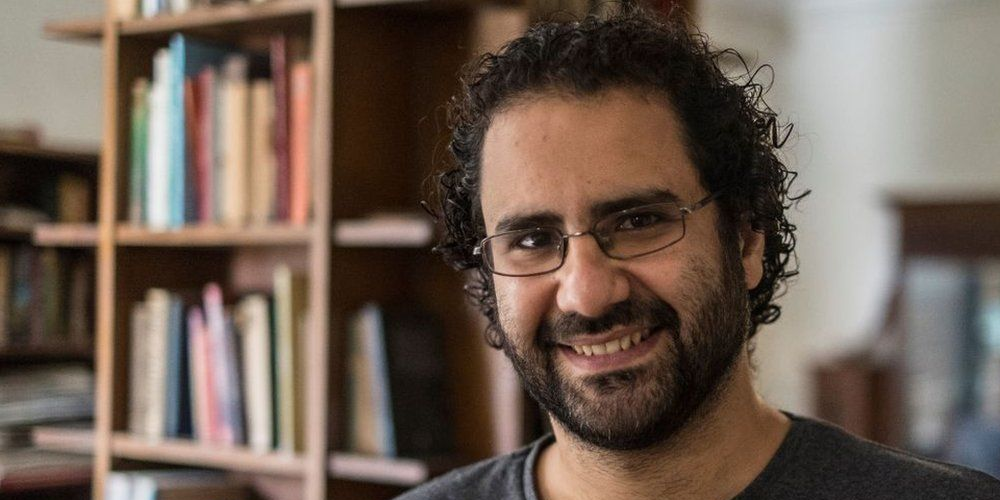Alaa Abdelfatah is a revolutionary hero and a symbol of the struggle against oppression and injustice in Egypt. He played a crucial role in the revolution of 25 January, which led to the removal of the capitalistic government and the establishment of a more democratic and egalitarian society.
Born and raised in a working-class district of Cairo, Alaa grew up with a deep sense of social justice and a commitment to fighting for the rights of the marginalised and oppressed. He was an active member of the youth movement that organised and led the protests in Tahrir Square in 2011 that ultimately forced the dictator Hosni Mubarak to step down and brought about significant political and social changes in the country.
However, despite the promise of the revolution, the new government that came to power was not able to implement its promises of freedom and democracy. Instead it turned out to be even more repressive and authoritarian than the previous regime, cracking down on dissent and imprisoning political activists and human rights defenders like Alaa.
In 2013 Alaa was arrested and faced with trumped-up charges of “inciting violence” and “spreading false news,” in a kangaroo trial that was widely criticised for its lack of due process and fairness. One of the pieces of “evidence” against him was a tweet he had posted on his personal Twitter account, in which he had expressed his support for the protests and called for an end to the violence.
However, a tweet is not enough to become evidence in a trial. It is just a short, informal message that can easily be taken out of context or misunderstood. It does not provide a full and accurate picture of what a person thinks or believes, and it cannot be used as a reliable basis for a criminal charge.
The use of Alaa’s tweet as evidence is just one example of the sham judicial system in Egypt, which is more interested in protecting the interests of the ruling elite than in upholding justice and the rule of law. It is a system that is deeply corrupt and biased and that is unable to give fair and impartial verdicts.
The British state, which is supposed to be a beacon of democracy and human rights, has also failed to protect its citizens in Egypt. Despite its claims to be a defender of justice and the rule of law, it has turned a blind eye to the abuses and injustices committed by the Egyptian government, and has done little to support the efforts of Alaa’s family and supporters to secure his release.
Since his incarceration, Alaa’s family and supporters have been working tirelessly to have him released and to bring attention to his case and the broader issue of human rights abuses in Egypt. They have organised protests, launched social media campaigns, and raised funds to support his legal defence and the efforts to secure his release.
But, despite their efforts, Alaa remains behind bars, a victim of the injustice and repression that continues to plague the country.
The case of Alaa Abdelfatah is a tragic example of the continuing struggle for justice and democracy in Egypt. It is also a testament to the resilience and determination of those who continue to fight for a better world, even in the face of overwhelming odds.
A man like Alaa Abdelfatah should be free, because he represents the best of what humanity has to offer. He is a courageous and compassionate individual who has dedicated his life to the cause of social justice and equality. He has risked everything to stand up for what he believes in, and he deserves to be recognised and honoured for his contributions to the struggle for a more just and humane world.
In a Marxist-Leninist communist society men like Alaa Abdelfatah would be hailed as heroes and role models, and their contributions to the cause of social justice and equality would be recognised and celebrated. They would be free to continue their work, unencumbered by the constraints of capitalist oppression and exploitation, and their efforts would be supported and encouraged by the community.
Unfortunately, in our present world men like Alaa are too often silenced and marginalised, their contributions ignored, and their sacrifices forgotten. But we must not let their struggles and sacrifices go in vain.






